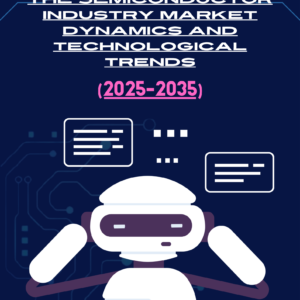1. Executive Summary
- Overview of the global data center energy crisis
- The role of AI and semiconductor technologies in achieving carbon neutrality
- Market opportunities and key trends in sustainable data center innovations
2. Data Centers and Their Growing Energy Problem
- The energy consumption challenges of modern data centers
- Impact of hyperscale data centers on global electricity demand
- The environmental footprint of traditional data centers and the push for sustainability
3. Carbon-Neutral Data Centers: Definition and Key Drivers
- What are carbon-neutral data centers?
- The regulatory push toward carbon-neutrality and green computing
- Corporate sustainability goals driving innovation in data center operations
4. The Role of AI in Optimizing Data Center Energy Efficiency
- AI-driven energy optimization solutions for data centers
- How AI is being used to monitor, manage, and reduce energy consumption
- Predictive analytics and AI in cooling systems and power management
- Case studies of AI-powered energy efficiency improvements in data centers
5. Semiconductor Innovations: Building Energy-Efficient Data Centers
- Next-generation semiconductors and their impact on power consumption
- The role of specialized chips like AI accelerators and low-power CPUs
- How chip design innovations are enabling more energy-efficient data center infrastructure
- Semiconductor-based cooling and heat dissipation solutions for data centers
6. Key Technologies Driving Carbon-Neutral Data Centers
- Overview of renewable energy integration in data centers
- Energy-efficient hardware (e.g., GPUs, CPUs, AI accelerators)
- Software-defined power management systems
- Battery storage and microgrid technologies for power redundancy
7. Challenges and Barriers to Carbon-Neutral Data Centers
- High initial capital expenditure for sustainable retrofits and greenfield projects
- Power consumption scaling with AI and machine learning workloads
- The global semiconductor supply chain and energy-efficient hardware availability
- Regulatory and technological barriers to achieving carbon neutrality
8. AI and Machine Learning Workloads: A Double-Edged Sword?
- Balancing the energy consumption of AI workloads with the need for energy savings
- The impact of training and inferencing on energy demand in AI-driven data centers
- Solutions for reducing the carbon footprint of AI workloads
9. Case Studies: Carbon-Neutral Data Center Implementations
- Case study 1: A hyperscaler achieving carbon-neutrality using AI-driven power management
- Case study 2: Semiconductor innovations in energy-efficient data centers
- Case study 3: Integration of renewable energy and microgrids in reducing data center emissions
10. The Role of Edge Computing in Alleviating Data Center Energy Loads
- How decentralization through edge computing reduces reliance on large data centers
- The benefits of distributing AI workloads across smaller, more energy-efficient nodes
- Edge AI and its impact on real-time data processing and energy optimization
11. Future of Carbon-Neutral Data Centers: Predictions and Outlook
- Trends in AI-powered sustainability solutions for data centers
- Expected advances in semiconductor technology for energy efficiency
- Market opportunities for investors and key areas of growth in carbon-neutral infrastructure
- Predictions on when the majority of global data centers can achieve carbon neutrality
12. Investment Opportunities in Sustainable Data Centers
- Market size and potential for carbon-neutral data center technologies
- Key companies leading the charge in AI-powered energy efficiency and green semiconductors
- The financial incentives for data centers to go carbon-neutral and reduce operating costs
- Risks and opportunities in investing in sustainable infrastructure for data centers
13. Conclusion: Can AI and Semiconductor Innovations Truly Solve the Energy Crisis?
- Recap of the major roles AI and semiconductors play in achieving carbon neutrality
- Final thoughts on the long-term feasibility of sustainable data centers
- Actionable insights for industry players, data center operators, and investors







